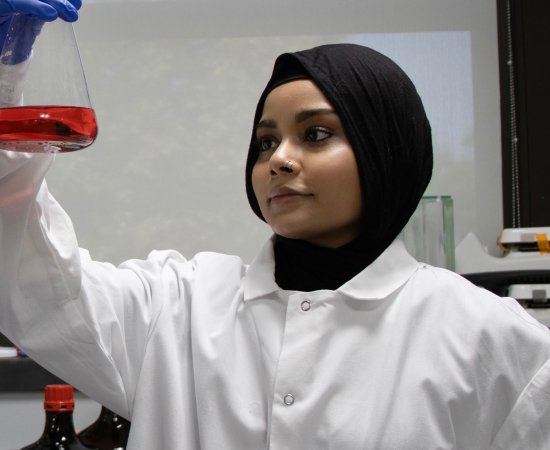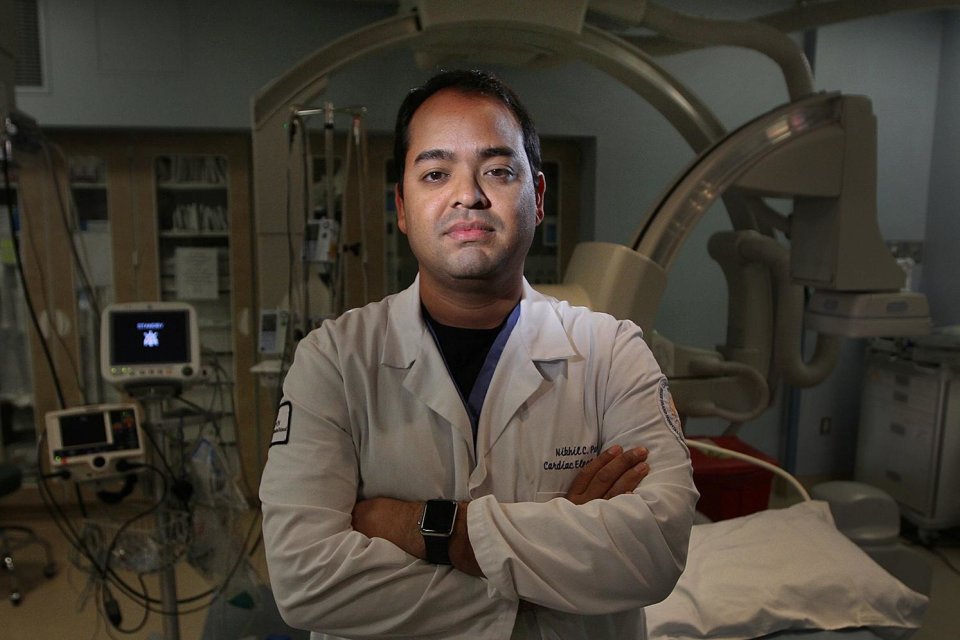
The Heart of the Matter: Dr. Nikhil Panda '02, one of the country's best cardiac electrophysiologists

Dr. Nikhil Panda '02 is one of the country's best cardiac electrophysiologists.
Even as a kid growing up in San Diego, California, Nikhil Panda ’02 had lofty goals.
His parents, who emigrated from India, often returned to their home country with their young son. There, Panda saw suffering so great, he was inspired to make a difference. He set his sights on becoming a physician.
Today he’s made his dream come true in a big way. As cardiac electrophysiologist—one of the country’s best, in fact—at Brown Alpert Medical School in Providence, Rhode Island, it’s not hyperbole to say he’s saving lives every day.
We talked to Dr. Panda, who is also a researcher and professor, to learn more about his experience at Utica, his career path, and what keeps him calm in the high-stakes world of complex heart surgery.
You grew up on the West Coast. What brought you to Utica University?
I wanted to experience a different part of the country for college. I really liked the small class sizes at Utica University and the idea that each student was not a number. I received a scholarship to Utica and had the opportunity to participate in the Honors Program. I knew I wanted to pursue medicine even as a high-school student, because I always thought becoming a doctor would be the ultimate way to help people and make a difference. At the time, Utica offered a combined medical degree program and opportunities for early entrance to the SUNY Upstate Medical University College of Medicine, which seemed to be a great fit for me. But it was quite the transition in climate from living in San Diego to Upstate New York!
Tell me about your experience at Utica. Did it shape your eventual career path?
Absolutely. I was able to do my senior thesis as a sophomore at the Masonic Medical Research Laboratory in Utica. I didn't know it at the time, but the laboratory is perhaps the most famous basic science laboratory in the field of cardiac electrophysiology, where of much of the knowledge of the field was discovered. There, I was able to work with one of the founders in the field, Dr. Charles Antzelevitch. That experience was instrumental in helping shape my future career as a physician and scientist. Through Utica University, I was also able to do clinical rotations abroad and study health policy in Europe. I became an EMT and phlebotomy-certified and participated in medical trips abroad. I also did chemistry research with Dr. Curtis Pulliam. When it was time to apply to medical school, I received tremendous support from the faculty and was admitted early, after my sophomore year.
It sounds like you were a busy student! Did you have time to enjoy the traditional college experience?
Yes, it was an unforgettable time that I will always look back on with the fondest of memories. I developed lifelong friendships at Utica, including my former roommate and best friend, Dr. Terry Li ’02. We met at Utica and then were roommates in medical school. We were in each other’s weddings.
Were there other people at Utica University who left an impact on you? Specific professors or advisers?
All the professors I had at Utica impacted my life in such a positive way, one way or another, but a few stand out: Dr. Judy McIntryre was my premedical adviser, and her encouragement throughout my college career was instrumental. She was more like a family member and would often invite me for dinner with her family. We keep in touch to this day. Dr. Ronald Lucchino worked extra hard as my faculty adviser to provide me with the mentorship and opportunities to be successful. Also, Mark Kovacs. He was the director of residence life during my time at Utica and went above and beyond to make sure I was adjusting to life away from home. He even attended my medical school graduation.
All the professors I had at Utica impacted my life in such a positive way, one way or another.
Your field, cardiac electrophysiology, is relatively new, having been developed in the mid-1970s. Can you describe it?
Cardiac electrophysiology is a very subspecialized field that deals with the medical and surgical treatment of electrical disorders of the heart. We are considered the “electrical engineers of heart” or the “heart electricians.” It employs the latest technologies in medicine, including robotic and computer-assisted procedures. We implant pacemakers and defibrillators, as well as perform cardiac ablations, in which we find and burn specific areas of the heart that are causing the rhythm disturbance.
What drew you to this field?
As a doctor, I wanted the opportunity to have a direct and immediate impact on patient's lives, and I’m fascinated by the novel technologies in this field that are constantly evolving and improving. I enjoy the variety in the procedures, as almost no two procedures are the same. I’ve always enjoyed working with my hands, and I like the intellectual challenge of finding an arrhythmia and eliminating it before my eyes. We deal with principles of anatomy, physiology, electrical engineering and physics on a daily basis, and we operate on some of the sickest hearts, so the difference we have on a patients’ lives is particularly rewarding.
Cardiac electrophysiology requires the most training of any medical field, so it’s been a long journey for you since graduating from Utica.
That’s right. In 2002, I started medical school at SUNY Upstate in Syracuse, then I entered the physician scientist training program at Case Western Reserve University and the Cleveland Clinic in Ohio, where I completed my residency, a fellowship in cardiology, and three years of a postdoctoral research fellowship in biomedical engineering, focusing on cell and tissue engineering for cardiac arrhythmias. I completed my clinical cardiac electrophysiology fellowship at the New York-Presbyterian/Weill Cornell Medical Center in New York City. I was one of the few electrophysiologists that completed an additional fellowship in advanced and complex cardiac ablation back in Cleveland.
What brought you to your current hospital in Rhode Island?
After fellowship, I wanted to pursue practice at an academic medical center where I would have the opportunity to practice with the latest technologies, teach the future generation of electrophysiologists, and perform research. That brought me to Brown University, where I’m able to do all those things. In addition to operating four days a week, I am the founder of several clinical studies and have developed new ablation techniques for the treatment of atrial fibrillation or AFib, a common electrical disorder where the top of the heart beats irregularly. I research cell therapy and tissue regeneration and try to engineer cells and tissue to restore electrical activity in the heart that has been damaged. I also have the opportunity to teach and mentor electrophysiology and cardiology fellows, residents, medical students, undergrads and postdoctoral research fellows. I’m extremely busy, but I look forward to coming to work every day!
What’s the most challenging part of your work?
The field of cardiac electrophysiology requires perseverance. Some procedures can last 6-8 hours, and a surgeon’s persistence ensures the best results for patients. One of the most challenging aspects is dealing with the limitations and bureaucracy of the current healthcare system that I feel can be a hindrance to patient care and research at times.
Do you still feel anxiety or pressure during surgeries? How do you cope in such a high-stakes environment?
I always have a very healthy respect for the heart, because of the importance and possible consequences of things that can happen. However, I like to think I work well under pressure, and I trust my experience and training, as everyone in the room feeds off my attitude. I’m manning the ship. It is important to remain calm so everyone, including nurses, trainees, and staff, can work toward providing the best possible outcomes for patients.
Tell me about your family.
I met my wife, Megha, in residency. She's an internist and pediatrician in the same hospital system at Brown. We’ve have two sons, Dhilan, who’s 3, and Shaan, who’s 1. We’ve only been in Rhode Island for a few years now, but we love the area. The beach is close by, and we go to Boston frequently.
Where do you see yourself in 10 years?
I hope just to continue to do what I do. Continue to do research, participate in clinical trials, and teach. And continue to watch my children grow.
More Stories


Big little sister

Local Organizations Give to Utica University’s Tangerine Group Food Pantry
I would like to see logins and resources for:
For a general list of frequently used logins, you can also visit our logins page.
